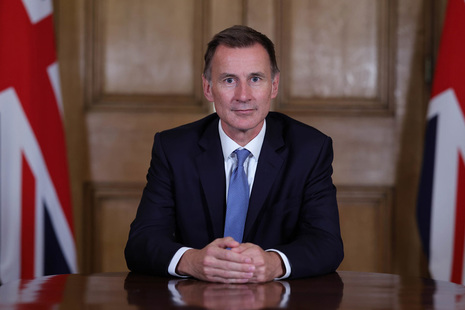As Chancellor Hunt reveals plans for the economy, for businesses and for consumers, investment and economics experts have been sharing their reaction to the Government’s new policy plans announced today in the House of Commons. While there is disappointment in many quarters, especially with no measures to support the housing market. However, others welcome the ‘rabbit out of the hat’ announcement of the 2% cut in employee NICs from January 2024 and some of the pensions changes.
With expectations of the Autumn Statement having widely circulated beforehand about cuts to taxes and national insurance, Chancellor Jeremy Hunt has been on his feet in the Chamber. Thinking back to a year ago when his Autumn Statement followed the disastrous mini-budget of Truss/Kwarteng, his focus then was on calming markets – especially the gilt market. This year, with some headroom in the budget calculations, the fact that a General Election is expected to take place next year cannot be far from anyone’s imagination when hearing today’s announcements and plans that the Government will introduce. But what do today’s measures mean for investment markets? For asset allocation decisions? For the economy and business more general – as well as consumers?
Investment, Tax and Economics experts have been sharing their reaction to today’s Autumn Statement announcements as follows:
Stewart Sanderson, Head of Private Clients at Brooks Macdonald believes Hunt was searching for growth as he comments:
“In stark contrast to last year, today’s Autumn Statement took place against a much more stable economic backdrop. Citing the fall of inflation down to 4.6% and better than expected GDP growth in 2023, the Chancellor confidently declared this was an Autumn Statement for a ‘country that had turned a corner’.
“Higher tax revenue boosted government funds, enabling the Chancellor to roll out a growth-oriented agenda. This is a budget that prioritises business-centric measures, including over 100 supply-side reforms, while also offering pre-election giveaways to savers and investors.
“Prior to today, Mr. Hunt said that he would “remove the barriers that stop businesses growing” and true to his word he delivered one of the most substantial tax cuts for business in recent times, making “full expensing capital allowance scheme” permanent. This £11 billion-a-year tax break should go some way to boosting business investment, economic growth, and the UK’s stagnant productivity.
“In a potential boost for UK industry, he announced a new ‘growth fund’ to be established within the British Business Bank to help get pension capital into high-growth start-ups.
“Despite his promise not to make any tax cuts that could lead to inflation, in a surprise move, Hunt reduced national insurance for 27 million people. However, it’s impact on inflation will likely be negligible given the 2022 freezing of tax rate thresholds which pushed many earners into higher tax brackets.
“Investors and savers will welcome a wide-ranging package of ISA reforms that simplify the system and encourage higher take up amongst younger people. The revamped regime includes the ability of individuals to contribute to multiple ISAs in the tax year without impacting their £20,000 allowance and will enable people to hold fractional shares within the tax wrapper.
“High interest rates still present a challenge for the economy and Hunt will hope to see Bank of England policy move in lockstep with his fiscal loosening, but yesterday Bailey cautioned that the market is underestimating inflation risks.
“For investors, the UK remains a difficult place to judge. While sentiment has improved in recent months, a downward revision to growth by the OBR and with inflation well above long-term targets, it’s not clear that we’re out of the woods just yet. The Chancellor believes we have turned a corner, but it’s still a long road ahead.”
James Lynch, fixed income manager at Aegon Asset Management, said:
“Jeremy Hunt had a good starting position today, as higher tax receipts this year gave him the ability to save or spend – he chose to spend it. In the short term, the 2% cut to National Insurance starting in January 2024, and over the medium term making permanent the tax relief on investment are the two largest contributors, along with raising benefits by 6.7% and state pensions by 8.5%. One could argue the cut to tax should boost consumption and the tax relief for business should lead to higher investment in future years.
“In the grand scheme of UK budgets, this was a mild disappointment but not a disaster for the gilt market. The market was expecting somewhere around the £10bn to £15bn area in cuts to gilt issuance this year but only got £0.5bn taking total gilt sales to £237.3bn, due to the measure announced today. Treasury bills were however reduced by £10bn.
“Short term, the focus of the gilt market will be the extra auctions that were not expected, medium term it will be the economic fundamentals of GDP, inflation and BoE rates that will still be determining the level of gilt yields.”
On news of the addition of Long Term Asset Funds and Open-Ended Property Funds in Innovative Finance ISAs, Oli Creasey, property research analyst at Quilter Cheviot, said:
“Today’s autumn statement included several changes that would allow for property funds, specifically those that are not daily-dealt, to be permitted investment in the Innovative Finance ISA, currently a tax vehicle mainly focused on peer-to-peer loans.
“The change is impactful for several reasons. First, it opens up a new route that would encourage retail investors to be able to (and therefore willing to consider) investment in property. That’s good news for the relatively new LTAF category, which has not yet gained much traction as a vehicle for property investment, though could be a key beneficiary of this.
“The other live issue in the open-ended property fund sector is a long-running consultation process where the FCA are considering whether to require daily-dealt property funds to put in place a redemption delay of either three or six months. This was aimed at reducing liquidity issues in these funds – something that came to a head again recently with several funds being forced to suspend in October 2023. However, no decision has yet been made by the FCA, in part we are told because putting such a delay in place would make those funds ineligible to be held in an ISA (where regular trading is a requirement) – and many of the funds are already wrapped up in retail investor ISAs already, making their removal a real headache.
“Making a non-daily property fund ISA-eligible, even if it is only within the IFISA framework, opens up a pathway where a relatively simple conversion can take place without funds having to be sold due to ineligibility. We imagine that this may then bring forward the final decision from the FCA, which has been a cloud hanging over the open-ended property sector for several years now.”
For Arun Singh, Global Chief Economist at Dun and Bradstreet, the measures from the full expensing corporate tax relief scheme to borrowing costs have focused his mind and what this really means for the overall health of the economy as he comments:
“With the UK government’s goal to half inflation before the end of the year already met, and fiscal headroom to make life easier for businesses, there was a mild sense of optimism that the country might be heading towards a more stable business environment – if not immediately, at least in the not-too-distant future. So, the big policy announcement making permanent the “full expensing” corporate tax relief scheme will be encouraging, and we think will improve business sentiment and stimulate investment, in time. What’s more, businesses should get a boost from the cut in national insurance, which may encourage people back into work, easing supply-side constraints in the labour market.
“However, businesses should remain cautious. Borrowing costs remain high and the new much-lower medium-term growth and higher-for-longer inflation outlooks from the OBR means that the impact of softer future demand should be carefully considered. With more economic challenges ahead, one factor that mustn’t be compromised is fool-proofing current and future strategies to ensure smarter decisions can be made. To do so, making full use of a range of tools and knowledge that lead to rich data insights will be key – this is essential to the overall resilience of businesses and will be the lifeline in turbulent times.”
Asking the question what was in today’s Autumn Statement for the environment, Dominic Rowles, lead ESG Analyst, Hargreaves Lansdown said:
“While tax cuts took centre stage in Jeremy Hunt’s Autumn Statement, some efforts were made to enhance the Government’s patchy record on sustainability. They are a welcome response to a series of recent policy shifts that seemed to pose serious challenges to the Government’s 2050 net zero target.
Among the top commitments were an initiative to introduce a cash sweetener of up to £10,000 over 10 years for those living closest to new energy generation and transmission infrastructure. It’s hoped this plan will speed up planning approvals for new infrastructure projects, which have been beset with delays and increased costs in recent years.
The Chancellor also restated his commitment to invest £4.5bn between 2025 and 2030 in strategic manufacturing, which includes £2bn for zero emission investments in the automotive sector, supporting the manufacturing, supply chain and development of zero emission vehicles. This could go some way to placating those automakers that needed to alter their investment plans when the government delayed plans to prohibit the sale of new combustion engine-powered cars in September.
There will also be £960m for a new green industries growth accelerator to support clean energy manufacturing including offshore wind, nuclear, Carbon Capture & Storage and hydrogen.”
Katharine Arthur, Partner & Head of Private Client, at top 25 Accountancy firm, haysmacintyre, said:
“With the tax burden at its highest since WW2, today’s changes to National Insurance could come as a welcome relief to many. But while pleasing on the face of it, this headline tax cut may not be as generous as it appears.
“Over the past year, sky-high inflation has pushed many people into higher tax bands, meaning a number of personal taxes have repeatedly broken record levels. While the National Insurance cuts will somewhat lessen the burden for many individuals the actual annual saving is, in reality, minor when compared to the current tax burden on households.
“With the cut targeted at employees and the self-employed, there are also questions over how much this actually helps businesses. While it will mean slightly more money in people’s pockets, which should help the wider economy, employers will now need to cope with more complicated payrolls, applying the new rates before the start of the new tax year, and meeting the costs of the increased Living Wage.
“Ultimately, with the country’s finances remaining stretched has the Chancellor decided to bank some more generous cuts or changes for another day?”
Commenting on the Autumn Statement, William Marshall, Chief Investment Officer – Hymans Robertson Investment Services (HRIS) says:
“The Chancellor has taken the latest positive inflation data as an opportunity to cut taxes. However, claiming victory over inflation when we are still well above the Bank of England’s 2% target seems a touch premature.
“The cut to National Insurance will be popular with the electorate but the Bank of England may be concerned that the fiscal boost could hamper their fight with inflation just as we are approaching the final difficult phase. The 2% cut to NI was larger than expected which pushed up gilt yields but only slightly. The improved government borrowing figures would have eased any concerns investors may have had over the tax cuts.”
Julia Rosenbloom, partner and personal tax specialist at law firm, Shakespeare Martineau, said:
“Some small wins for businesses and workers – but overall another budget without bite.
“With this statement supposedly aimed at further tackling the cost-of-living crisis, there are some welcome measures that will improve circumstances for a number of people. The increase to the national living wage, the abolition of Class 2 national insurance and cuts to self-employed and employee national insurance will put more money in the pockets of Brits – but these measures don’t go far enough.
“Without tackling the big hitters such as inheritance tax or capital gains tax, this budget can be described as bland at best.
“Whilst there are some good aspects including the extension of capital expenditure deductions in business investments, there simply isn’t enough incentive for entrepreneurs to take on increased financial risk. In fact, the increase to the minimum wage could put some employers at a disadvantage if they have a large number of workers on low wages, potentially putting a ceiling on the chancellor’s plans before the ink has dried.”
Comments from Daniele Antonucci, Chief Investment Officer at Quintet Private Bank (parent of Brown Shipley) on UK Autumn Statement
Daniele Antonucci, CIO at Quintet Private Bank points out that there was some fiscal relief for businesses commenting:
“Even though the budget, taken at face value, looks somewhat stimulative relative to our baseline, it doesn’t appear to be a game-changer. UK economic growth remains weak, with a recessionary impulse coming through. In this context, we stand by our high-conviction call that interest rates have peaked and, therefore, gilts are attractively valued (with bond prices likely to rise and, therefore, yields to fall). Our tactical positioning is moderately defensive, with more high-quality bonds and less riskier bonds and equities vs our long-term asset allocation.
“Chancellor Jeremy Hunt announced that he’ll cut national insurance by 2% to 10%, possibly somewhat more than expected.
“Contrary to previous headlines, there were no changes to the inheritance tax. He’ll also make business investment tax relief permanent, allowing firms to deduct spending on IT equipment, plant or machinery from taxable profits. Whether this increases investment in the economy by some £20 billion per year within a decade remains to be seen. The Chancellor also confirmed that the state pension will rise by 8.5% next April and that other benefits linked to inflation will increase by 6.7% (September’s level, rather than the lower one from October). How much support this provides to the economy is unclear, though the fiscal multipliers (which estimate the spending impact) tend to be low. How much of this plan will stay after next year’s election is an open question, too.”
When it comes to the economy, Antonucci sees a flatlined trajectory commenting: “With markets still apprehensive about a possible resurgence of inflation versus the UK economy’s weak cyclical outlook, this budget announcement was always likely to be a trade-off between a reasonable fiscal path and some economic support. Taken at face value, some of the measures, if enacted, mitigate the probability of recession (certainty of a deep one). That probability, however, remains fairly elevated, given the lagged impact of rate hikes feeding through, even though we’re talking about a relatively mild recession and perhaps a rather short-lived one. From a market point of view, there’s not much difference between a short, mild recession and a stagnating economy. The key point is that UK economic growth prospects, in the near term, appear rather shallow, though perhaps a bit less than before this announcement and the latest batch of economic data, which generally surprised our expectations somewhat to the upside.
Considering market implications, quality bonds are clearly a high-conviction call for Quintet: “ We think the budget measures and the UK economic outlook still support our call that gilts are attractively valued. As economic growth and inflation slow, we think bond yields will fall, and bond prices will increase, making it an opportune moment to lock in a decent yield for a reasonably low risk. Conversely, in our view, the additional yield of lower-quality bonds seems too small to take the extra risk, especially as markets haven’t fully dealt with the impact of past interest rate hikes, and so default rates may pick up more than expected. Our tactical view on UK equities, at this stage, is neutral. We’re neutral on sterling, too. The weaker growth rate of the UK vs the US supports a strong dollar for now. But we think the trajectory for sterling is more sideways going forward, with perhaps some modest appreciation when that growth differential (with the US slowing, too) diminishes.”





